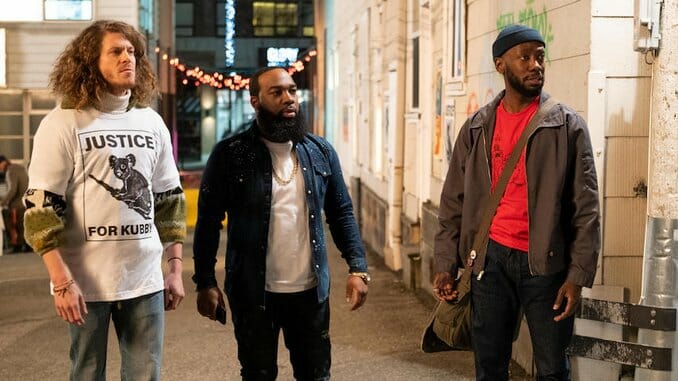Hulu’s Woke and the Importance of Timing, Timing, Timing
What a difference a year makes.
Photo Courtesy of Hulu
This year has been unrelenting. Between the global pandemic, the ongoing fight for racial justice and equity, and most recently, the onslaught of wildfires tearing through the west coast (just to name a few major headlines from the past six months), it’s all been—in David Rose-speak—“a bit much.” Arguably, these cumulative threats to our collective and individual health have opened up some very necessary conversations about the lives many of us had been leading prior to the pandemic—over-caffeinated, over-worked, under-rested, blinders on, aimlessly shuffling toward an elusive, capitalist-created goal—so it’s not exactly all been for naught. In other words, the awful truths of our shared reality have been exposed, and now it’s up to us to decide what to do about it.
In Hulu’s new series Woke, fictional cartoonist Keef Knight (based on real-life cartoonist Keith Knight) is going through a similar awakening, though his newfound wokeness comes in a pre-pandemic world. The series was shot entirely before lockdown, and it shows. Lamorne Morris, perhaps best known as Winston from New Girl, plays Keef, a Black San Francisco-based cartoonist who just wants to work on his comic strip “Toast & Butter” without getting ensnared in identity politics—or anything too controversial, for that matter. He likes to “keep it light,” as he tells Ayanna (Saturday Night Live’s Sasheer Zamata), but as the title of the show reveals, the universe has greater plans in store for him.
After being mistaken for a mugger and thrown to the ground by police in a public square, Keef is all shook up and blessed with the “superpower” of interacting with a whole peanut gallery of inanimate objects ranging from a talking trash can to a sassy 40 oz. bottle of malt liquor to, naturally, his favorite pen. Each have a lot to say. Their message to him is clear: you’re woke now and there’s no turning back.
Police brutality is nothing new. Anti-Blackness is nothing new. In a pre-pandemic, pre-George Floyd, pre-Breonna Taylor, pre-Jacob Blake world, there have been plenty of instances of false convictions (the Central Park Five) and the murder of unarmed victims (Trayvon Martin). Just because a cop hasn’t pulled a gun on you, specifically, doesn’t mean that systemic issues don’t affect your life. But this, by and large, is how Keef has skated through life prior to the public square incident—seemingly unaware, or simply unwilling to acknowledge, the racism that permeates even progressive, “woke” San Francisco. Which, in the context of the world we live in today, feels just about as plausible as a talking fountain pen.
The unavoidable question that crops up as the eight-episode series plays out is: Who is the intended audience for this show? Given the high-tension, high-stakes reality that we exist within these days, it feels woefully off-tone to assume that there are Black people who might similarly think that the whole “race thing” is just being blown out of proportion. And the way Keef ultimately begins to proselytize about the new truths he’s discovered is so on-the-nose that one has to wonder who exactly would find these revelations fresh and eye-opening. (For instance, at one point early on, he’s horrified to realize that his publishers have lightened his skin in publicity photos. At another point, Keef is paid by a wealthy white woman to attend an upscale party, where he’s somehow surprised that he has to endure awkward questions about reparations and Black culture, a la Get Out.)
-

-

-

-

-

-

-

-

-

-

-

-

-

-

-

-

-

-

-

-

-

-

-

-

-

-

-

-

-

-

-

-

-

-

-

-

-

-

-

-








































